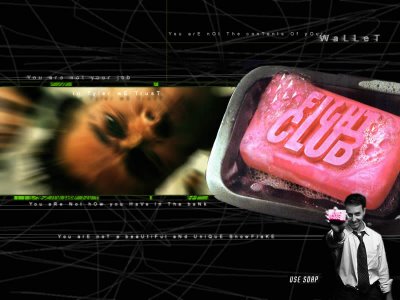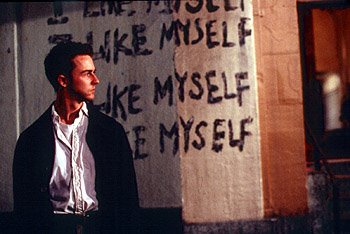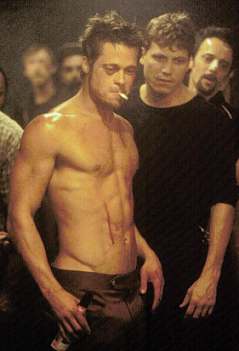Going Post(al) Modern
 Fight Club centers on the solitary life of a lonely individual. Our hero is played by Edward Norton. His job is mundane, and his life outside of work is little better. His only "thing" is the stuff he buys for his apartment: designer items he selects with the greatest of care. His humdrum existence is interupted by the charismatic "Tyler."
Fight Club centers on the solitary life of a lonely individual. Our hero is played by Edward Norton. His job is mundane, and his life outside of work is little better. His only "thing" is the stuff he buys for his apartment: designer items he selects with the greatest of care. His humdrum existence is interupted by the charismatic "Tyler."
Tyler is a sado-masochistic anarchist plotting to destroy civilization. He has vision and the energy to carry it out. People respond to him. People feed off of his passion, not the least of which is our hero who has found an inspiration to escape his monotony.
Together, the pair builds an army of disenfranchised young men looking for something greater than themselves. Eventually, as the plot unfolds we find that our hero and Tyler are actually one and the same person. It is a multiple-personality disorder to the extreme.
One thing that fascinates me about this movie is that the main character (played by Edward Norton, left) is so deeply divided. He is, at the same time, in love with all of his material possessions and, on a deeper level, desiring to blow it all up. He cannot, of course, blow it up, but this desire to escape his routine existence and participate in something bigger is so great that it actually causes a rift in his psyche and creates another personality. This personality can get rid of his stuff and pull him into something greater. But this is someone outside of himself, even if the person is a creation out of our hero's own imagination.
Is it too great of a stretch to make a comparison with our post-modern generation? We were born as consumers and have been programmed to respond to the marketing campaigns all bidding for our dollars. And we love our stuff: ipods, laptops, cars, clothes, movies, music. It's all great. But for all its greatness it locks us in. We, like the Fight Club character, become servants of our stuff, at least to some degree. Our interests become split. Perhaps we could even say that in our day people display the same personality split: Hanging on to our material possessions and the desire for something bigger and greater than ourselves. So, in some sense today's person seems spiritually schitzophrenic: a post(al) modern character on the brink of utter destruction. Desiring to completely demolish his own civilization and yet unable to do so until someone from the outside intervenes. There is a cost to this destruction. And the Edward Norton character is unable to pay the cost. Only "Tyler" can make this happen.
So, in some sense today's person seems spiritually schitzophrenic: a post(al) modern character on the brink of utter destruction. Desiring to completely demolish his own civilization and yet unable to do so until someone from the outside intervenes. There is a cost to this destruction. And the Edward Norton character is unable to pay the cost. Only "Tyler" can make this happen.
I wonder if we are ready to pay the cost, spiritually. We can dabble in spirituality - meditation, reading, charitable giving, even prayer - but have we truly reached out for something greater to the degree that we have sacrificed everything.
The Fight Club character eventually must demolish his own house with all of the things he has so carefully selected. He must, in the end, completely disconnect from his previous life in order to achieve something greater. He must sacrifice.
The Kingdom is like that. Only those who have completely blown up their "stuff" can truly taste it. The "stuff" is whatever our old self holds on to. Whatever it is that we are depending upon for our survival. Whatever our crutch is that we lean on to get through the monotony and apathy of our lives. And that isn't easy, because it's a matter of survival. We must, quite literally, risk our lives. Do we need a "Tyler"? Someone from the outside? A Savior, perhaps?
The kingdom of heaven is like treasure hidden in a field. When a man found it, he hid it again, and then in his joy went and sold all he had and bought that field.
Again, the kingdom of heaven is like a merchant looking for fine pearls. When he found one of great value, he went away and sold everything he had and bought it. (Matthew 13)







11 comments:
That's awesome!
Fight Club and Office Space both address that same issue, but obviously in different ways.
Both show twenty and thirty something's angst with life and their desire for something more, for something deeper.
There's an "is this all there is?" question looming in both movies.
Good thought on Office Space!
Whereas in Fight Club they overcome through force in Office Space the main character (Peter) overcomes via apathy. He simply doesn't care anymore and through the "big thinking" of the consultants Peter gets promoted simply for not caring. It winds up being his bosses fault for "not challenging him."
On a related note, come check out my post for today.
Here are some personal reflections about Fight Club from Jim Emerson, a professional film reviewer/commenter. In effect he says that in Jack the movie is presenting an accurate and personally moving characterization of clinical depression. I understand, Erdman, that you never seem to experience depressive episodes, but I think Emerson is right. What the movie illustrates is how depression doesn't have to come from inside the world; it can come from one's interface with the culture of meaningless work, consumerism, and hopelessness about systemic change.
"depression doesn't have to come from inside the world"
An interesting verbal slip there -- I meant that depression doesn't have to come from inside the head.
Why do you say that I don't experience episodes of depression?
I'm curious. Were you being sarcastic? Or have you truly assumed that I do not experience depressive episodes?
Also, thanks for the link; it is very appreciated. Looks like a great article. Right now I've got to pay some bills and then keep a lunch appointment, but I'll get back to it soon.
Thanks.
One thing I haven't done yet on my blog is do a more thorough review of Fight Club. I think I might add that to my future posts list.
No, not sarcastic. Maybe it's because every time I ask how you're doing you seem to be doing fine. So I overgeneralize. Or maybe it's because I've been sort of low-intensity depressed for a couple of years now, one aspect being that I assume I'm occupying a different and less pleasant (un)emotional space than everyone else.
This sort of depression seems too pallid to merit the label. I suspect Jack wouldn't have considered himself depressed. Numb, anhedonic, anomic, etc. maybe, but not depressed. It's like he could recognize his depression only retrospectively, after some emotion started seeping back into his life.
Perhaps my attempt to hide....I don't consider myself extremely depressive....perhaps melancholic is a better word; but for some reason I go through phases of blogging: for a few days I will blog like crazy, then I will take several days where I won't even go online. It repulses me! Such swings tend to reflect my personality shading: when I feel slightly depressed or melancholic, then I tend to avoid the blogs (and internet), as a general rule....a general rule that certainly gets broken.
I seem to recall your telling me, Erdman, that the collective agenda of Operation Mayhem was more coherent in the book. In the movie it seemed like an afterthought, a nihilistic externalization of what was essentially a psychological urge to self-destruction. But I think there is an intrinsic connection between symptoms in the self and symptoms in the world. Without anything worthwhile to commit yourself to in work, you wind up focusing on your pay and what you can buy with it. The System wants you to contribute to the bottom line both as producer and consumer, so they're going to want to keep the symptoms subjective: you're angry, depressed, alienated. They want you restored to the full, upright and locked position as part of the system. The requisite insight, however, is that the machine itself is enraging, depressing, alienating. Then comes the crucial question: do you adapt yourself to a pathogenic environment; do you try to intervene constructively with some aspect of it; do you blow it up; do you opt out of it?
Have you seen any of The Wire? It too addresses these issues. Part of the issue is whether there is a Big Other behind the System that keeps it moving, or does it rely entirely on everyone's complicity. I'm prone to believe there's a bit of both, with the Big Other being the people who stand to gain the most from the System's perpetuation.
lover99 視訊交友視訊交友聊天室 no8視訊交友聊天室 no8oec 喔伊細辣妹視訊交友oec 喔伊細辣妹視訊交友視訊交友 kugirl視訊ukiss視訊交友 kugirl電話網愛視訊交友電話網愛視訊交友168 視訊交友168 視訊交友5320 視訊交友5320 視訊交友視訊交友高雄網視訊交友高雄網383視訊影音城視訊交友web365kiss168下載a視訊聊天室v6 0台灣成人網免費線上歐美av美女美女美女遊戲無碼a片美女寫真xxx383美女寫真日本美女寫真集玩美女人a片網aio交友愛情館tt1069同志交友網
Post a Comment